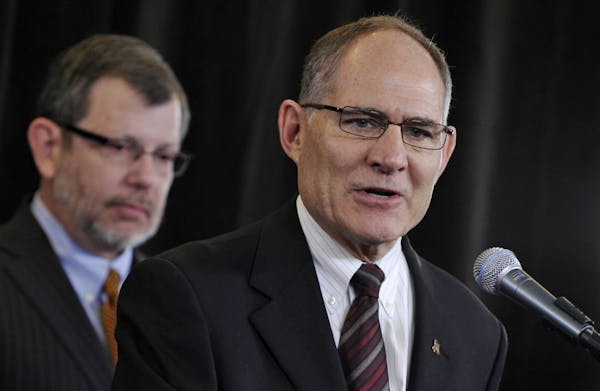A former associate golf coach at the University of Minnesota who sued the school, alleging that it fired her after learning she was a lesbian, was awarded nearly $360,000 Tuesday by a Hennepin County district judge.
Katie Brenny was coach for less than two months in 2010 when, she said, most of her job duties disappeared without any reasonable explanation. She appealed all the way up to then-athletic director Joel Maturi, but eventually was told to resign or to go sell premium tickets and suites for campus events.
Brenny decided to quit, and later came to believe that prominent local golfer and then-university golf program director John Harris had pushed her out after learning that she was a lesbian.
In his 38-page order, Judge Thomas Sipkins wrote that Brenny was intentionally subjected to disparate treatment based on her sexual orientation. Despite the fact that Harris was dropped from the case early on, Sipkins singled him out in his ruling, saying that he demeaned and belittled Brenny and prevented her from performing her job. Attempts to reach Harris on Tuesday were not successful.
Sipkins said the university violated the state's Human Rights Act prohibition of discrimination against a person on the basis of sexual orientation. He awarded Brenny a maximum of $334,000 for lost wages based on the university's conduct, plus another maximum of $25,000 for mental anguish.
Brenny, 33, now works for a youth program in New York City that uses golf to teach life skills. She did not respond to a request for comment Tuesday.
Her attorney, Donald Chance Mark Jr., said that the outcome of her suit has national implications and that it has drawn especially keen interest from the gay community. Tennis great Billie Jean King offered a deposition on behalf of Brenny, he said.
"I think this certainly is vindication for Katie," Mark said. "This confirms the discrimination she experienced while employed at the University of Minnesota. It will help serve as a deterrent for discrimination based on sexual orientation."
In response to the ruling, university spokesman Chuck Tombarge said, "With due respect to the court, we are disappointed with the decision and will closely review the findings, conclusions and order, and determine the appropriate next steps."
Mark said that when notified of the judge's decision, Brenny was very excited. It has been a difficult experience for her, he said; she feels her character and credibility have been attacked.
Judge questions testimony
Brenny filed suit against the U's Board of Regents in late 2010. During the nonjury bench trial, several key U employees testified that they didn't know her sexual orientation. Sipkins said the case turned on witness credibility and the totality of the circumstances.
Brenny, a native of Little Falls, Minn., and a former state high school golf champ, worked as a club professional in North Carolina and as a staff member on the PGA Tour's Developmental Nationwide Tour, as well as playing professionally, before taking her "dream job" at the university in August 2010. Within a few weeks, she said, she wasn't allowed to travel to tournaments and became little more than an administrative assistant to Harris.
Sipkins made it clear that he did not find some testimony credible, such as Harris' denial that he smirked while asking Brenny: "Did you really think I would let you travel alone [to a golf tournament] with those five girls?" The judge also wrote that he sensed a lack of credibility in some of the testimony by Elizabeth Eull, chief of staff of policy and initiatives for university President Eric Kaler, about Brenny's job duties changing.
Sipkins also cited several pieces of testimony that he said showed Harris' discriminatory attitude toward Brenny. Although there was some conflicting testimony, the judge wrote that he believes Harris learned Brenny was a lesbian from Ernie Rose, then-director of swing instruction for the women's team and Harris' son-in-law. Rose was told by a former women's golf coach.
One of Brenny's former golfers testified that several team members knew that their associate coach was gay but that they didn't care. Rose testified that he would be insulted if somebody called him homophobic because an immediate member of his family is gay, as is a member of Harris' family.
Rose, Harris and Maturi are no longer with the university's athletic program.
In his order, Sipkins wrote that Maturi, Eull and assistant athletic director David Crum consistently deferred to Harris' wishes. This permitted Harris' poor treatment of Brenny and led to the adverse employment actions he took against her, Sipkins said.
Richard Brenny, Katie Brenny's father, said Tuesday he didn't realize how badly she was suffering until hearing her testimony. When she told him at the time how bad it was, "I just couldn't believe it," he said. "The whole system failed," he said. "And all the people involved are gone."
He said he hopes the U has corrected the problems his daughter faced or is at least working toward a solution. He's happy with how the suit turned out, but said his daughter sacrificed much of her personal life in the process.
"We had tears right to the very end," he said. "She is surviving this."
David Chanen • 612-673-4465

A tale of 124 hoarded Minnesota cats has at least a hundred happy endings

Walz, St. Paul leaders urge support for copper wire theft bill: 'We've got to get in front of it'
Body of missing canoeist, 15, recovered from southwest Minnesota lake

High winds flipped a FedEx truck traveling on Bong Bridge in Duluth

